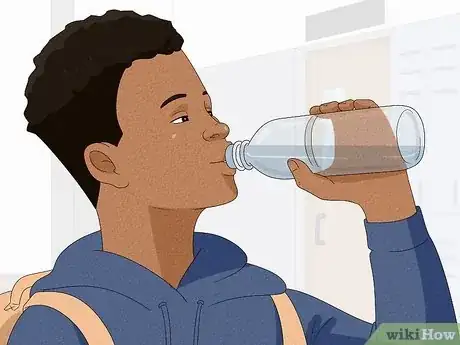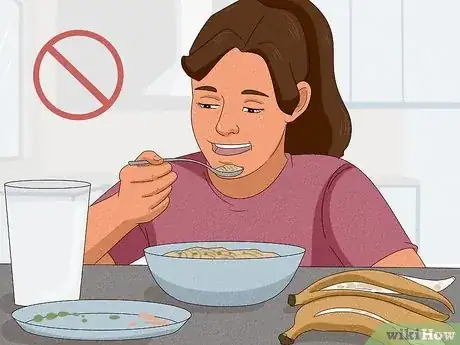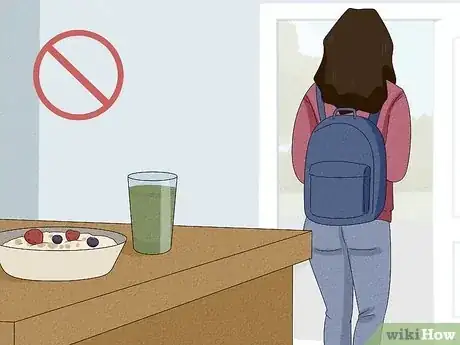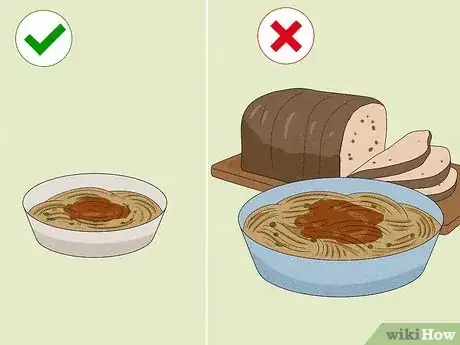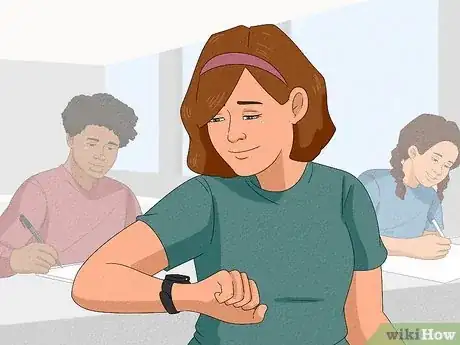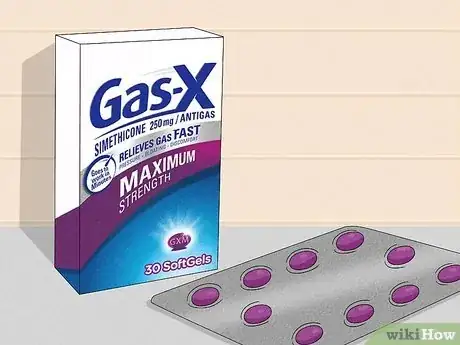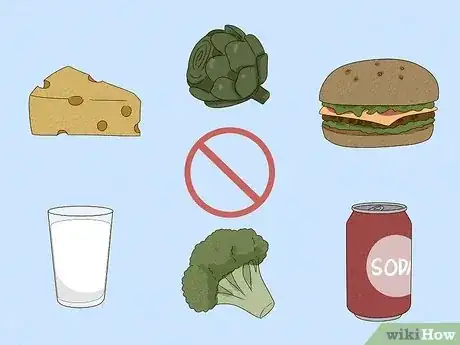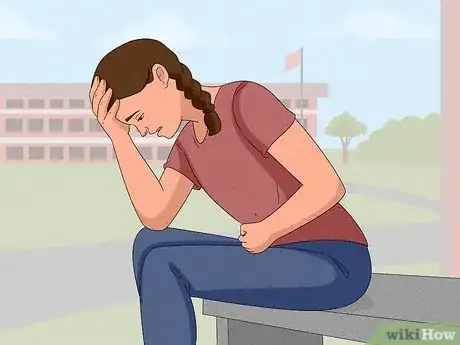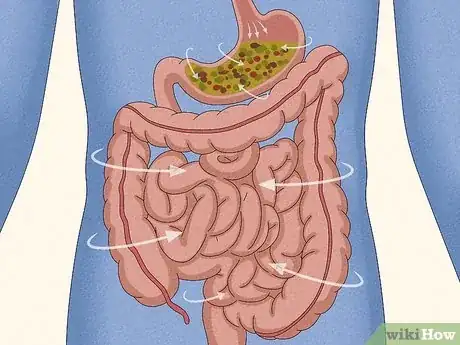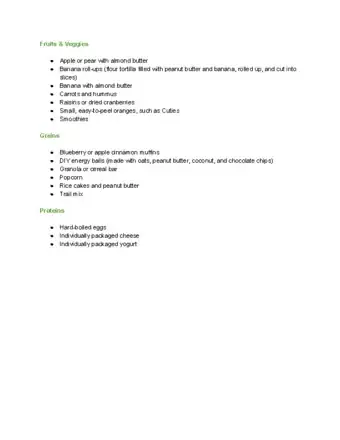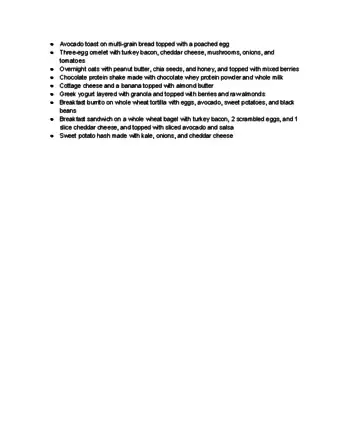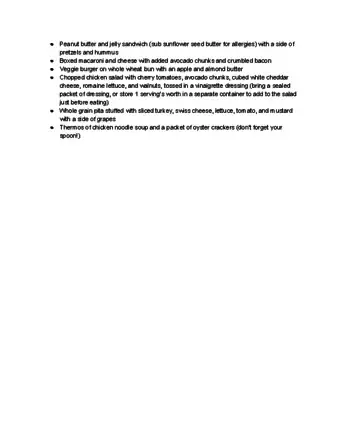This article was co-authored by Peter Gardner, MD and by wikiHow staff writer, Hannah Madden. Peter W. Gardner, MD is a board certified physician who has practiced Gastroenterology and Hepatology for over 30 years. He specializes in diseases of the digestive system and liver. Dr. Gardner earned his Bachelor’s degree from the University of North Carolina and attended Georgetown Medical School. He completed his residency in Internal Medicine and then his fellowship in Gastroenterology at the University of Connecticut. He is a previous Chief of Gastroenterology at Stamford Hospital and remains on the staff. He is also on the staff of Greenwich Hospital and New York (Columbia) Presbyterian Hospital. Dr. Gardner is an Approved Consultant in Internal Medicine and Gastroenterology with the American Board of Internal Medicine.
There are 10 references cited in this article, which can be found at the bottom of the page.
wikiHow marks an article as reader-approved once it receives enough positive feedback. This article has 24 testimonials from our readers, earning it our reader-approved status.
This article has been viewed 1,748,465 times.
You’re sitting in a completely quiet classroom, listening to the sounds of your classmates’ pencils on paper. Suddenly, a noise happens: it’s your stomach! If this situation sounds familiar to you, you’re not alone—many of us have had our stomachs rumble in less-than-ideal situations. If you’re ready to stop your stomach from growling and get back to focusing on your classwork, you’ve come to the right place. We’ll give you all the tips you need to stop your stomach from making noise fast.
Things You Should Know
- Drink some water. Sometimes stomach gurgling is a sign you're thirsty.
- Try not to overeat right before class, since that can cause an upset stomach.
- Limit the amount of indigestible foods you eat, like potatoes, pears, and broccoli.
- Take a short walk after you eat to aid in digestion and stop your stomach from growling.
Steps
Following a Healthy Eating Regimen
-
1Drink water. Sometimes when your stomach gurgles, you’re not actually hungry—you’re thirsty. Keep a water bottle nearby and take sips whenever you feel the need. That way, your stomach won’t growl as a reminder to stay hydrated.[1]
- Try not to chug water, especially right before class. While drinking small amounts of water throughout the day is good, chugging a lot of water all at once can make your stomach gurgle even louder.
-
2Try not to eat large meals before class. When you eat too much food, it will put your digestive system into overdrive.[2] The growling can occur more often when this happens, because there is more to move through the intestines.
- If you do eat too much and need to recover from it, try taking a short walk or drinking herbal tea.
Advertisement -
3Avoid going to class on an empty stomach. When your stomach has been empty for 2 hours, the growling sounds louder. This is because there is little or nothing in the stomach to absorb or muffle the noise. When you go hours without eating, your body releases hormones that let the brain know it’s time to clear anything left in the stomach to make room for whatever food is to come.[3]
- Have small, healthy snacks with you at all times.
-
4Limit indigestible foods.[4] Certain carbs are resistant to digestion. Don’t avoid carbs completely, since they help supply you with energy. Simply eat them in moderation to keep your stomach healthy but less likely to growl.[5]
- Resistant starch: potatoes or pasta that has been cooled after cooking, sourdough bread, and unripe fruit.
- Insoluble fiber: whole-wheat flour, wheat bran, cabbage, lettuce, and bell peppers.
- Sugar: apples, pears, and broccoli.
-
5Pay attention to your hunger cues. Remember that growling can happen both when you’ve just eaten and when you haven’t eaten in a while. Figure out when the best meal time for you is, and be sure to keep snacks on-hand just in case.[6]
- Most people need 3 full meals and 2 to 3 snacks per day.
-
6Eat slowly and chew properly. People who swallow a lot of air usually experience more stomach growling than others. If you eat too fast or talk a lot while eating, you are likely swallowing a lot of air. Eat more slowly to avoid this.[7]
Avoiding Gas
-
1Take gas relief medicines. Excessive gas in the gut can cause loud stomach growling. A simple way to reduce bloating and gas is by taking an over-the-counter gas relief medication. Try to take it before you eat food that causes you to be overly gassy.[8]
-
2Avoid dairy and high-fiber foods before class. Certain foods are known to cause gas because of the complexity in breaking them down.[9] Avoiding an excess of these foods will help control your stomach growling. Limit foods like:
- Cheese
- Milk
- Artichokes
- Pears
- Broccoli
- Beans
- Fast food
- Soda
-
3Take a walk after you eat. It doesn’t have to be more than a ½ a mile. Walking will aid in digestion and keep your bowels moving along in a healthy manner.
- Plus, walking for just 10 minutes after a meal has been proven to lower your blood pressure, along with other health benefits.[10]
Addressing Disorders and Intolerances
-
1Exercise consistently. A sedentary lifestyle can lead to stomach problems, which can cause loud gurgling. Not exercising will create a negative impact on your weight and physical tolerance to certain foods which will lead to a bloated stomach, gas, and extremely loud noises.[11]
- Try to get around 150 minutes of exercise per week to stay healthy and fit.[12]
-
2Treat any anxiety or nervousness you may experience. If you are constantly nervous or anxious, your nerves send signals to your stomach. These signals cause gurgling sounds. If you notice that you experience stomach gurgling throughout the day, regardless of diet or lifestyle changes, you may have a nervous disorder that can be addressed by a doctor.[13]
- Visit a mental health professional to talk about your symptoms of anxiety and how best to treat them.
-
3Learn food intolerance symptoms. Consuming certain food items can cause allergic reactions that cause an upset stomach and force stomach gurgling.[14] If you notice stomach discomfort often after eating the same kinds of food—avoid that food. The most common kind of food intolerance is lactose intolerance. This is when dairy products cause intense stomach irritation.[15]
- To test for lactose intolerance, see how you feel after eating foods with lactose in them, like milk, cheese, and butter. If you have symptoms like an upset stomach, nausea, or diarrhea, it’s likely that you’re lactose intolerant.
-
4Notice severe indigestion, also known as dyspepsia. Upper abdominal pain, excessive belching, nausea, feeling full after a small amount of food and swelling of the abdominals are all symptoms of a more serious indigestion problem. If you experience these consistently, seek medical attention. Dyspepsia is not a life-threatening problem but should be addressed.[16]
- To get rid of indigestion and cure nausea, try drinking tea with ginger in it or getting some fresh air.
-
5Understand why your stomach is growling. Your stomach growling is caused by your digestive system doing what it’s supposed to do: mixing food, fluids, and gastric juices and pushing them through the intestinal tract. The rumbling occurs when the walls of your gastrointestinal tract contracts and relaxes to squeeze everything through the intestines. Even with a proper diet, growling is bound to happen sometimes, and there’s no reason to be embarrassed.[17]
Meal and Snack Ideas
Community Q&A
-
QuestionWhat is the best breakfast meal that will keep me from being hungry for about four hours?
 Community AnswerEat food that is higher in proteins, such as eggs and sausage in the morning. You also might add toast so you have a little more food in your stomach to last you until lunch.
Community AnswerEat food that is higher in proteins, such as eggs and sausage in the morning. You also might add toast so you have a little more food in your stomach to last you until lunch. -
QuestionCan this noise be heard by others?
 SherringfordCommunity AnswerYes, in a quiet environment, it can usually be heard by those near you.
SherringfordCommunity AnswerYes, in a quiet environment, it can usually be heard by those near you. -
QuestionWhat sort of snack should I bring for in between lessons as I only have 2 minutes in between each one?
 Community AnswerNuts are a great snack if you can eat them. They're full of healthy oils and protein. Plus, a small handful is usually a serving size! Quick and easy. If you can't eat nuts, try dried fruit, small crackers or some celery sticks.
Community AnswerNuts are a great snack if you can eat them. They're full of healthy oils and protein. Plus, a small handful is usually a serving size! Quick and easy. If you can't eat nuts, try dried fruit, small crackers or some celery sticks.
References
- ↑ https://patient.info/news-and-features/why-does-your-stomach-rumble-when-you-arent-hungry
- ↑ Peter Gardner, MD. Board Certified Gastroenterologist. Expert Interview. 25 August 2020.
- ↑ http://www.mayoclinic.org/diseases-conditions/gas-and-gas-pains/in-depth/gas-and-gas-pains/art-20044739
- ↑ Peter Gardner, MD. Board Certified Gastroenterologist. Expert Interview. 25 August 2020.
- ↑ http://www.mayoclinic.org/diseases-conditions/gas-and-gas-pains/in-depth/gas-and-gas-pains/art-20044739
- ↑ https://www.pennmedicine.org/updates/blogs/health-and-wellness/2020/april/how-to-understand-hunger-cues
- ↑ http://www.mayoclinic.org/diseases-conditions/gas-and-gas-pains/in-depth/gas-and-gas-pains/art-20044739
- ↑ https://www.mayoclinic.org/diseases-conditions/gas-and-gas-pains/diagnosis-treatment/drc-20372714
- ↑ Peter Gardner, MD. Board Certified Gastroenterologist. Expert Interview. 25 August 2020.
- ↑ https://www.ncbi.nlm.nih.gov/pmc/articles/PMC3119587/
- ↑ https://badgut.org/information-centre/a-z-digestive-topics/physical-activity-and-gi-health/
- ↑ https://www.cdc.gov/physicalactivity/basics/adults/index.htm
- ↑ https://adaa.org/learn-from-us/from-the-experts/blog-posts/consumer/overcoming-irritable-bowel-syndrome-ibs
- ↑ Peter Gardner, MD. Board Certified Gastroenterologist. Expert Interview. 25 August 2020.
- ↑ Peter Gardner, MD. Board Certified Gastroenterologist. Expert Interview. 25 August 2020.
- ↑ http://www.medicinenet.com/dyspepsia/page8.htm#how_is_dyspepsia_indigestion_treated_and_relieved
- ↑ http://www.mayoclinic.org/diseases-conditions/gas-and-gas-pains/in-depth/gas-and-gas-pains/art-20044739
About This Article
To prevent empty-stomach growls during class, eat a small meal or drink some juice before class starts. Make sure your meal doesn't contain indigestible foods like pasta or whole-wheat flour, or your stomach might actually growl louder. If the growling is because you're gassy, stop eating foods that cause gas, like cheese and beans. You can also try taking over-the-counter gas relief medicine to stop your stomach noises. For more tips on stopping stomach growling, like eating slower and exercising more, read the article!
